Deck 7: Ingredients of Multivariable Change: Models, Graphs, Rates
Question
Question
Question
Question
Question
Question
Question
Question
Question
Question
Question
Question
Question
Question
Question
Question
Question
Question
Question
Question
Question
Question
Question
Question
Question
Question
Question
Question
Question
Question
Question
Question
Question
Question
Question
Question
Question
Question
Question
Question
Question
Question
Question
Question
Question
Question

Unlock Deck
Sign up to unlock the cards in this deck!
Unlock Deck
Unlock Deck
1/46
Play
Full screen (f)
Deck 7: Ingredients of Multivariable Change: Models, Graphs, Rates
1
Consider the graphs of  below. At
below. At  is
is  decreasing when w decreases or when s decreases? Explain your answer.
decreasing when w decreases or when s decreases? Explain your answer. 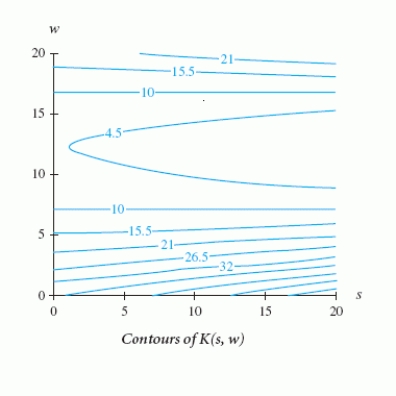
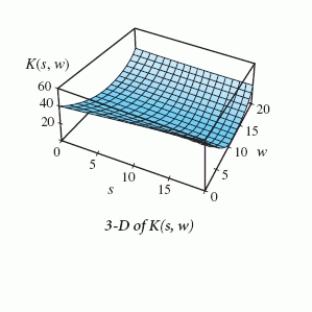
A) decreases when w decreases because the lower valued contour curves are in that direction.
decreases when w decreases because the lower valued contour curves are in that direction.
B) decreases when w decreases because the contour curve slope is negative in that direction.
decreases when w decreases because the contour curve slope is negative in that direction.
C) decreases when w decreases because the rate of change is smaller in that direction.
decreases when w decreases because the rate of change is smaller in that direction.
D) decreases when s decreases because the lower valued contour curves are in that direction.
decreases when s decreases because the lower valued contour curves are in that direction.
E) decreases when s decreases because the rate of change is smaller in that direction.
decreases when s decreases because the rate of change is smaller in that direction.
 below. At
below. At  is
is  decreasing when w decreases or when s decreases? Explain your answer.
decreasing when w decreases or when s decreases? Explain your answer. 

A)
 decreases when w decreases because the lower valued contour curves are in that direction.
decreases when w decreases because the lower valued contour curves are in that direction.B)
 decreases when w decreases because the contour curve slope is negative in that direction.
decreases when w decreases because the contour curve slope is negative in that direction.C)
 decreases when w decreases because the rate of change is smaller in that direction.
decreases when w decreases because the rate of change is smaller in that direction.D)
 decreases when s decreases because the lower valued contour curves are in that direction.
decreases when s decreases because the lower valued contour curves are in that direction.E)
 decreases when s decreases because the rate of change is smaller in that direction.
decreases when s decreases because the rate of change is smaller in that direction. decreases when s decreases because the lower valued contour curves are in that direction.
decreases when s decreases because the lower valued contour curves are in that direction. 2
Consider any point  on the contour graph of
on the contour graph of  given below. Determine (if possible) what happens to the function output when x remains constant and y increases?
given below. Determine (if possible) what happens to the function output when x remains constant and y increases? 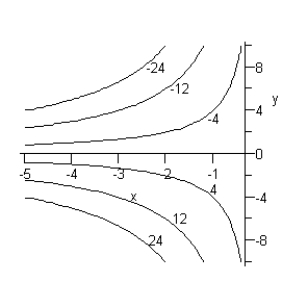
A) The function decreases.
B) The function increases.
C) The function remains constant.
D) The function decreases and then increases.
E) Cannot be determined from the given information.
 on the contour graph of
on the contour graph of  given below. Determine (if possible) what happens to the function output when x remains constant and y increases?
given below. Determine (if possible) what happens to the function output when x remains constant and y increases? 
A) The function decreases.
B) The function increases.
C) The function remains constant.
D) The function decreases and then increases.
E) Cannot be determined from the given information.
The function decreases.
3
The table shows the number of hours of daylight for a given month at a given latitude (measured in degrees away from the equator) for the northern and southern hemispheres. How many hours of daylight will there be at a location at latitude  north in March?
north in March? 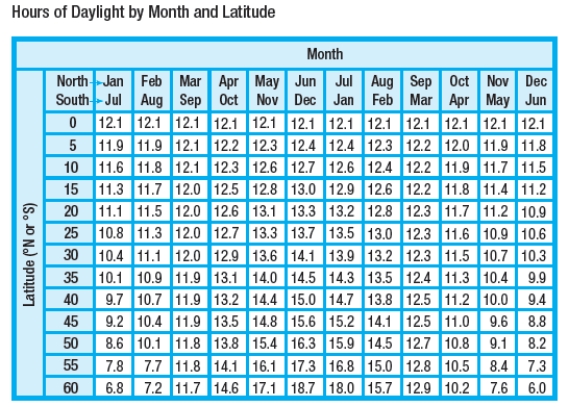
A) 12.0
B) 12.6
C) 11.5
D) 12.1
E) 11.3
 north in March?
north in March? 
A) 12.0
B) 12.6
C) 11.5
D) 12.1
E) 11.3
12.0
4
The function  gives the capacity of a settled unopened silo in tons of silage when the silo has an inside diameter of d feet and the silage is h feet deep. Draw the 170-tons contour curve for d between 12 and 30 feet.
gives the capacity of a settled unopened silo in tons of silage when the silo has an inside diameter of d feet and the silage is h feet deep. Draw the 170-tons contour curve for d between 12 and 30 feet.
A)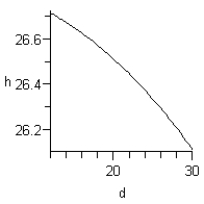
B)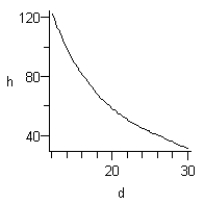
C)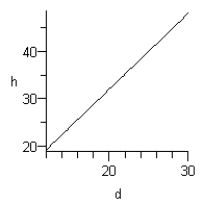
D)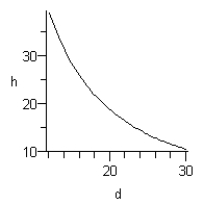
E)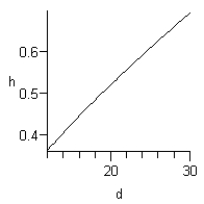
 gives the capacity of a settled unopened silo in tons of silage when the silo has an inside diameter of d feet and the silage is h feet deep. Draw the 170-tons contour curve for d between 12 and 30 feet.
gives the capacity of a settled unopened silo in tons of silage when the silo has an inside diameter of d feet and the silage is h feet deep. Draw the 170-tons contour curve for d between 12 and 30 feet.A)

B)

C)

D)

E)


Unlock Deck
Unlock for access to all 46 flashcards in this deck.
Unlock Deck
k this deck
5
Consider the graphs of  below. Determine, (if possible), if the change in
below. Determine, (if possible), if the change in  will be greater when the position changed from
will be greater when the position changed from  to
to  or when it changes from
or when it changes from  to
to 
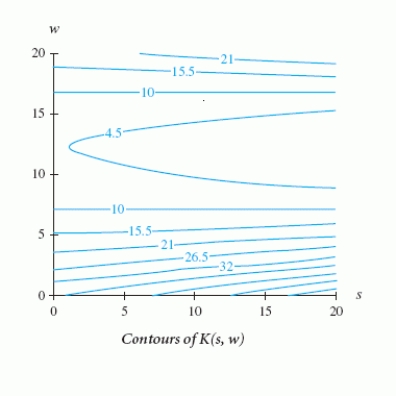
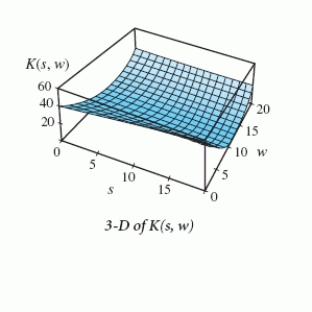
A) The change is greater from to
to 
B) The change is greater from to
to 
C) The change is non-zero and approximately the same in both cases.
D) There is no change in either case.
E) Cannot be determined from the given information.
 below. Determine, (if possible), if the change in
below. Determine, (if possible), if the change in  will be greater when the position changed from
will be greater when the position changed from  to
to  or when it changes from
or when it changes from  to
to 


A) The change is greater from
 to
to 
B) The change is greater from
 to
to 
C) The change is non-zero and approximately the same in both cases.
D) There is no change in either case.
E) Cannot be determined from the given information.

Unlock Deck
Unlock for access to all 46 flashcards in this deck.
Unlock Deck
k this deck
6
A process to extract pectin and pigment from sunflower heads involves washing the sunflower heads in heated water. The three dimensional graph and associated contour graph below show the percentage of pigment that can be removed from the sunflower head by washing it for t minutes in r milliliters of water per gram of sunflower heads when the water temperature is  Estimate the percentage of pigment removed from 20 grams of sunflower heads if the sunflower heads are washed for 5 minutes in 30 milliliters of water at
Estimate the percentage of pigment removed from 20 grams of sunflower heads if the sunflower heads are washed for 5 minutes in 30 milliliters of water at 
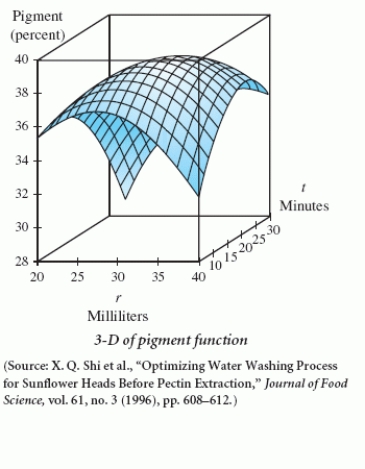
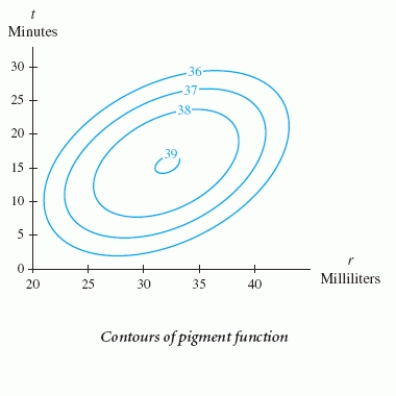
A) 740%
B) 780%
C) 37%
D) 36%
E) 39%
 Estimate the percentage of pigment removed from 20 grams of sunflower heads if the sunflower heads are washed for 5 minutes in 30 milliliters of water at
Estimate the percentage of pigment removed from 20 grams of sunflower heads if the sunflower heads are washed for 5 minutes in 30 milliliters of water at 


A) 740%
B) 780%
C) 37%
D) 36%
E) 39%

Unlock Deck
Unlock for access to all 46 flashcards in this deck.
Unlock Deck
k this deck
7
Draw the contour curves 
 and
and  for the multivariable function
for the multivariable function  for
for 
A)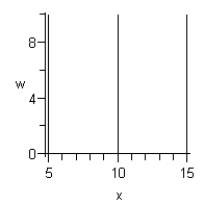
B)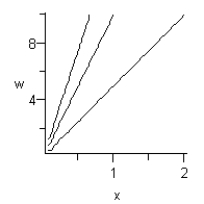
C)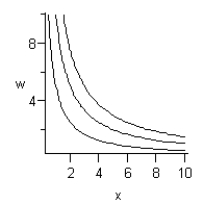
D)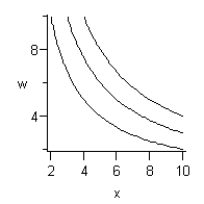
E)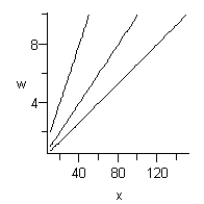

 and
and  for the multivariable function
for the multivariable function  for
for 
A)

B)

C)

D)

E)


Unlock Deck
Unlock for access to all 46 flashcards in this deck.
Unlock Deck
k this deck
8
Draw the contour curves 
 , and
, and  for the multivariable function
for the multivariable function  for
for 
A)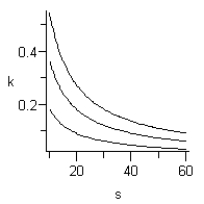
B)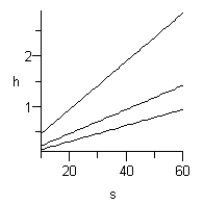
C)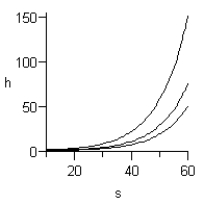
D)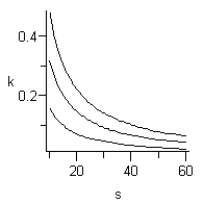
E)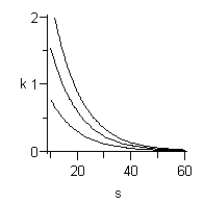

 , and
, and  for the multivariable function
for the multivariable function  for
for 
A)

B)

C)

D)

E)


Unlock Deck
Unlock for access to all 46 flashcards in this deck.
Unlock Deck
k this deck
9
A process to extract pectin and pigment from sunflower heads involves washing the sunflower heads in heated water. The three dimensional graph and associated contour graph below show the percentage of pigment that can be removed from the sunflower head by washing it for t minutes in r milliliters of water per gram of sunflower heads when the water temperature is  Estimate how much water would be necessary to remove 37% of pigment removed from 4 grams of sunflower heads if the sunflower heads are washed for 25 minutes at
Estimate how much water would be necessary to remove 37% of pigment removed from 4 grams of sunflower heads if the sunflower heads are washed for 25 minutes at 
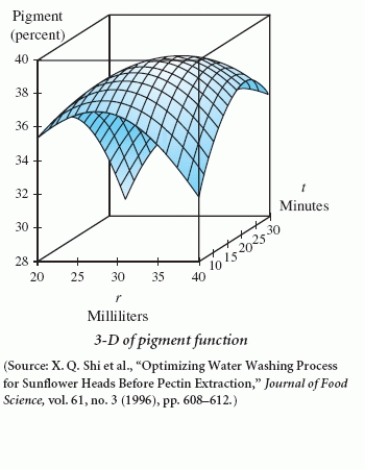
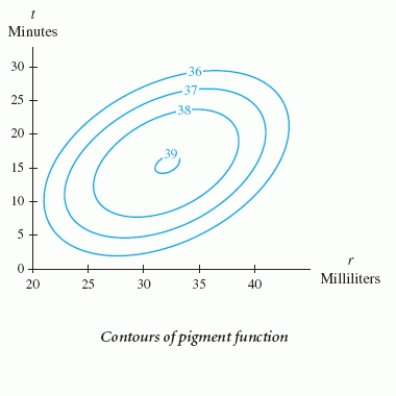
A) 30 milliliters
B) 30 milliliters or 120 milliliters
C) 30 milliliters or 39 milliliters
D) 120 milliliters or 156 milliliters
E) 156 milliliters
 Estimate how much water would be necessary to remove 37% of pigment removed from 4 grams of sunflower heads if the sunflower heads are washed for 25 minutes at
Estimate how much water would be necessary to remove 37% of pigment removed from 4 grams of sunflower heads if the sunflower heads are washed for 25 minutes at 


A) 30 milliliters
B) 30 milliliters or 120 milliliters
C) 30 milliliters or 39 milliliters
D) 120 milliliters or 156 milliliters
E) 156 milliliters

Unlock Deck
Unlock for access to all 46 flashcards in this deck.
Unlock Deck
k this deck
10
The table shows the number of hours of daylight for a given month at a given latitude (measured in degrees away from the equator) for the northern and southern hemispheres. How many hours of daylight will there be in January in the region where you attend school? 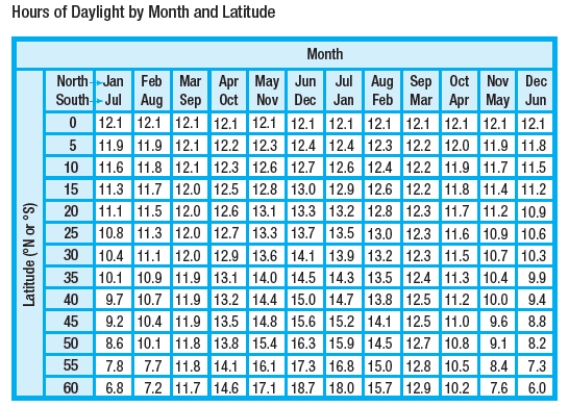
A) Answers will vary based on location of the school.
B) 6.8
C) 11.6
D) 12.1
E) 10.4

A) Answers will vary based on location of the school.
B) 6.8
C) 11.6
D) 12.1
E) 10.4

Unlock Deck
Unlock for access to all 46 flashcards in this deck.
Unlock Deck
k this deck
11
Consider the point  on the contour graph of
on the contour graph of  given below. When x is decreased by 1, by what amount must y change in order to remain on the same contour curve?
given below. When x is decreased by 1, by what amount must y change in order to remain on the same contour curve? 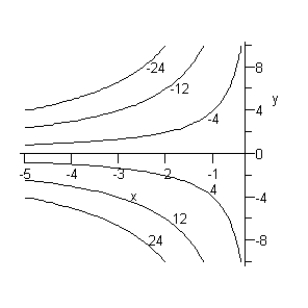
A) decrease by 2
B) increase by 2
C) increase by 4
D) decrease by 4
E) no change is needed
 on the contour graph of
on the contour graph of  given below. When x is decreased by 1, by what amount must y change in order to remain on the same contour curve?
given below. When x is decreased by 1, by what amount must y change in order to remain on the same contour curve? 
A) decrease by 2
B) increase by 2
C) increase by 4
D) decrease by 4
E) no change is needed

Unlock Deck
Unlock for access to all 46 flashcards in this deck.
Unlock Deck
k this deck
12
Consider the point  on the contour graph of
on the contour graph of  given below. When y is decreased by 2, by what amount must x change in order to remain on the same contour curve?
given below. When y is decreased by 2, by what amount must x change in order to remain on the same contour curve? 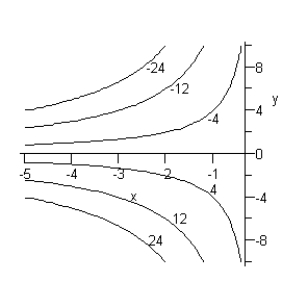
A) decrease by 1
B) increase by 1
C) increase by 3
D) decrease by 3
E) no change is needed
 on the contour graph of
on the contour graph of  given below. When y is decreased by 2, by what amount must x change in order to remain on the same contour curve?
given below. When y is decreased by 2, by what amount must x change in order to remain on the same contour curve? 
A) decrease by 1
B) increase by 1
C) increase by 3
D) decrease by 3
E) no change is needed

Unlock Deck
Unlock for access to all 46 flashcards in this deck.
Unlock Deck
k this deck
13
The contour graph  and its associated three-dimensional graph are given below. Determine (if possible) if the change in
and its associated three-dimensional graph are given below. Determine (if possible) if the change in  will be greater when
will be greater when  shifts to
shifts to  or when
or when  shifts to
shifts to 
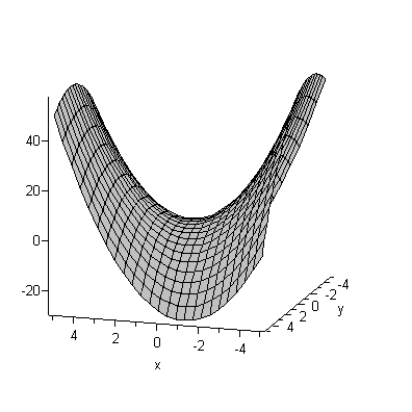
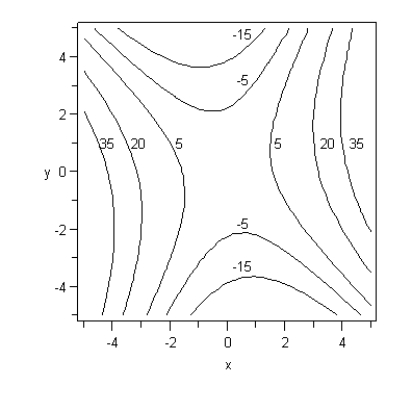
A) Cannot be determined from the given information.
B) The change is approximately the same in both cases and is greater than zero.
C) There is no change in either case.
D) The shift from to
to  is greater.
is greater.
E) The shift from to
to  is greater.
is greater.
 and its associated three-dimensional graph are given below. Determine (if possible) if the change in
and its associated three-dimensional graph are given below. Determine (if possible) if the change in  will be greater when
will be greater when  shifts to
shifts to  or when
or when  shifts to
shifts to 


A) Cannot be determined from the given information.
B) The change is approximately the same in both cases and is greater than zero.
C) There is no change in either case.
D) The shift from
 to
to  is greater.
is greater.E) The shift from
 to
to  is greater.
is greater.
Unlock Deck
Unlock for access to all 46 flashcards in this deck.
Unlock Deck
k this deck
14
The face value of a loan is  dollars where the payment amount of
dollars where the payment amount of  dollars is paid
dollars is paid  times a year for
times a year for  years at
years at  interest. Rewrite
interest. Rewrite  as a model with two input variables.
as a model with two input variables.
A) dollars is the face value of a loan for which the payment amount is
dollars is the face value of a loan for which the payment amount is  dollars paid 12 times a year for
dollars paid 12 times a year for  years at 6% interest.
years at 6% interest.
B) dollars is the face value of a loan for which the payment amount is
dollars is the face value of a loan for which the payment amount is  dollars paid 6 times a year for
dollars paid 6 times a year for  years at 12% interest.
years at 12% interest.
C) dollars is the face value of a loan for which the payment amount is
dollars is the face value of a loan for which the payment amount is  dollars paid 12 times a year for
dollars paid 12 times a year for  years at 60% interest.
years at 60% interest.
D) dollars is the face value of a loan for which the payment amount is
dollars is the face value of a loan for which the payment amount is  dollars paid 12 times a year for
dollars paid 12 times a year for  years at 0.6% interest.
years at 0.6% interest.
E) dollars is the face value of a loan for which the payment amount is
dollars is the face value of a loan for which the payment amount is  dollars paid 6 times a year for
dollars paid 6 times a year for  years at 6% interest.
years at 6% interest.
 dollars where the payment amount of
dollars where the payment amount of  dollars is paid
dollars is paid  times a year for
times a year for  years at
years at  interest. Rewrite
interest. Rewrite  as a model with two input variables.
as a model with two input variables.A)
 dollars is the face value of a loan for which the payment amount is
dollars is the face value of a loan for which the payment amount is  dollars paid 12 times a year for
dollars paid 12 times a year for  years at 6% interest.
years at 6% interest.B)
 dollars is the face value of a loan for which the payment amount is
dollars is the face value of a loan for which the payment amount is  dollars paid 6 times a year for
dollars paid 6 times a year for  years at 12% interest.
years at 12% interest.C)
 dollars is the face value of a loan for which the payment amount is
dollars is the face value of a loan for which the payment amount is  dollars paid 12 times a year for
dollars paid 12 times a year for  years at 60% interest.
years at 60% interest.D)
 dollars is the face value of a loan for which the payment amount is
dollars is the face value of a loan for which the payment amount is  dollars paid 12 times a year for
dollars paid 12 times a year for  years at 0.6% interest.
years at 0.6% interest.E)
 dollars is the face value of a loan for which the payment amount is
dollars is the face value of a loan for which the payment amount is  dollars paid 6 times a year for
dollars paid 6 times a year for  years at 6% interest.
years at 6% interest.
Unlock Deck
Unlock for access to all 46 flashcards in this deck.
Unlock Deck
k this deck
15
The contour graph  and its associated three-dimensional graph are given below. At
and its associated three-dimensional graph are given below. At  will
will  decrease more quickly as x decreases or as y decreases? Justify your answer.
decrease more quickly as x decreases or as y decreases? Justify your answer. 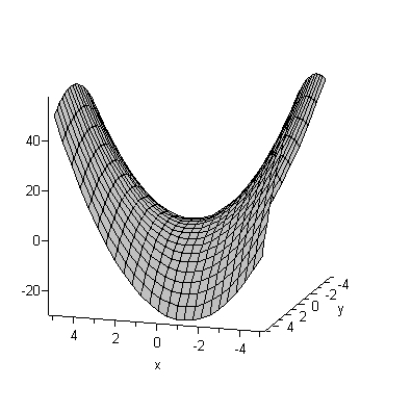
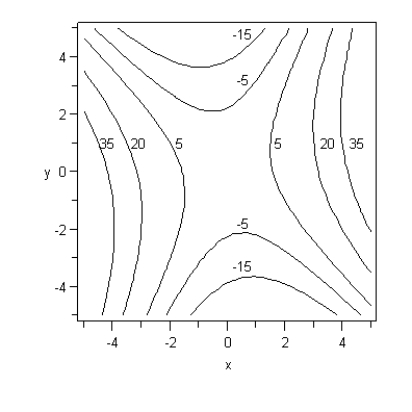
A) decreases at the same rate in both directions because the contours are parabolic.
decreases at the same rate in both directions because the contours are parabolic.
B) will decrease more quickly when x decreases because the difference in contours is greater in that direction.
will decrease more quickly when x decreases because the difference in contours is greater in that direction.
C) will decrease more quickly when x decreases because the contours have negative slope in that direction.
will decrease more quickly when x decreases because the contours have negative slope in that direction.
D) will decrease more quickly when y decreases because the difference in contours is greater in that direction.
will decrease more quickly when y decreases because the difference in contours is greater in that direction.
E) will decrease more quickly when y decreases because the contours have negative slope in that direction.
will decrease more quickly when y decreases because the contours have negative slope in that direction.
 and its associated three-dimensional graph are given below. At
and its associated three-dimensional graph are given below. At  will
will  decrease more quickly as x decreases or as y decreases? Justify your answer.
decrease more quickly as x decreases or as y decreases? Justify your answer. 

A)
 decreases at the same rate in both directions because the contours are parabolic.
decreases at the same rate in both directions because the contours are parabolic.B)
 will decrease more quickly when x decreases because the difference in contours is greater in that direction.
will decrease more quickly when x decreases because the difference in contours is greater in that direction.C)
 will decrease more quickly when x decreases because the contours have negative slope in that direction.
will decrease more quickly when x decreases because the contours have negative slope in that direction.D)
 will decrease more quickly when y decreases because the difference in contours is greater in that direction.
will decrease more quickly when y decreases because the difference in contours is greater in that direction.E)
 will decrease more quickly when y decreases because the contours have negative slope in that direction.
will decrease more quickly when y decreases because the contours have negative slope in that direction.
Unlock Deck
Unlock for access to all 46 flashcards in this deck.
Unlock Deck
k this deck
16
The contour graph  and its associated three-dimensional graph are given below. At
and its associated three-dimensional graph are given below. At  does
does  increase when x increases or when x decreases? Justify your answer.
increase when x increases or when x decreases? Justify your answer. 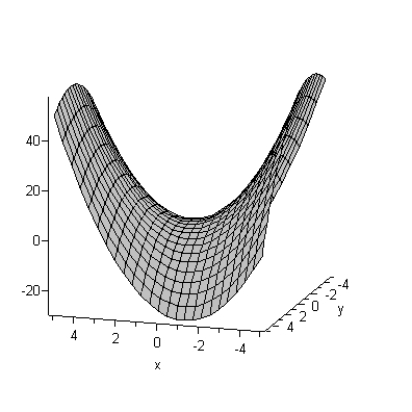
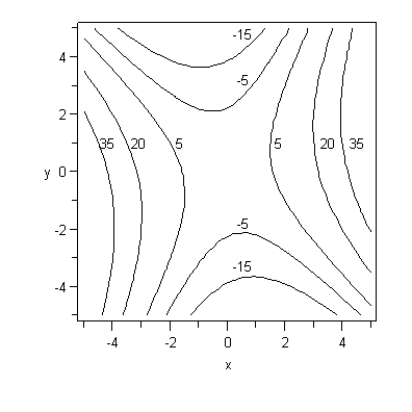
A) increases in both directions because the contours are parabolic.
increases in both directions because the contours are parabolic.
B) increase when x increases because the contours are nearly vertical.
increase when x increases because the contours are nearly vertical.
C) increase when x increases because the contours increase in that direction.
increase when x increases because the contours increase in that direction.
D) increase when x decreases because the contours are nearly vertical.
increase when x decreases because the contours are nearly vertical.
E) increase when x decreases because the contours increase in that direction.
increase when x decreases because the contours increase in that direction.
 and its associated three-dimensional graph are given below. At
and its associated three-dimensional graph are given below. At  does
does  increase when x increases or when x decreases? Justify your answer.
increase when x increases or when x decreases? Justify your answer. 

A)
 increases in both directions because the contours are parabolic.
increases in both directions because the contours are parabolic.B)
 increase when x increases because the contours are nearly vertical.
increase when x increases because the contours are nearly vertical.C)
 increase when x increases because the contours increase in that direction.
increase when x increases because the contours increase in that direction.D)
 increase when x decreases because the contours are nearly vertical.
increase when x decreases because the contours are nearly vertical.E)
 increase when x decreases because the contours increase in that direction.
increase when x decreases because the contours increase in that direction.
Unlock Deck
Unlock for access to all 46 flashcards in this deck.
Unlock Deck
k this deck
17
Let  be the profit in dollars from the sale of 1 meter of carpet when c dollars is the production cost per meter and s dollars is the selling price per meter. Write a sentence interpreting the mathematical notation
be the profit in dollars from the sale of 1 meter of carpet when c dollars is the production cost per meter and s dollars is the selling price per meter. Write a sentence interpreting the mathematical notation 
A) When carpet costs $1.30 per meter to produce, the sale of 1 meter at $4.50 per meter will result in $2.00 in profit.
B) When carpet costs $1.30 per meter to produce, the sale of 1 meter at $2.00 per meter will result in $4.50 in profit.
C) Selling 1.3 meters of carpet at $4.50 per meter results in $2.00 profit.
D) Selling 4.5 meters of carpet at $1.30 per meter results in $2.00 profit.
E) When carpet costs $1.30 per meter to produce, 2 meters of carpet must be sold at $4.50 per meter in order to make a profit.
 be the profit in dollars from the sale of 1 meter of carpet when c dollars is the production cost per meter and s dollars is the selling price per meter. Write a sentence interpreting the mathematical notation
be the profit in dollars from the sale of 1 meter of carpet when c dollars is the production cost per meter and s dollars is the selling price per meter. Write a sentence interpreting the mathematical notation 
A) When carpet costs $1.30 per meter to produce, the sale of 1 meter at $4.50 per meter will result in $2.00 in profit.
B) When carpet costs $1.30 per meter to produce, the sale of 1 meter at $2.00 per meter will result in $4.50 in profit.
C) Selling 1.3 meters of carpet at $4.50 per meter results in $2.00 profit.
D) Selling 4.5 meters of carpet at $1.30 per meter results in $2.00 profit.
E) When carpet costs $1.30 per meter to produce, 2 meters of carpet must be sold at $4.50 per meter in order to make a profit.

Unlock Deck
Unlock for access to all 46 flashcards in this deck.
Unlock Deck
k this deck
18
The figures show the profit (in hundred dollars) to craft fair organizers when  hundred daily admission tickets and
hundred daily admission tickets and  hundred weekend admission tickets to a large craft fair are purchased. Estimate the output value for point
hundred weekend admission tickets to a large craft fair are purchased. Estimate the output value for point  .
. 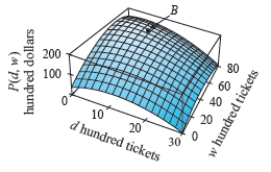
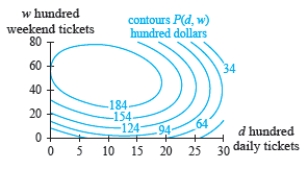
A) 187
B) 154
C) 107
D) 60
E) 124
 hundred daily admission tickets and
hundred daily admission tickets and  hundred weekend admission tickets to a large craft fair are purchased. Estimate the output value for point
hundred weekend admission tickets to a large craft fair are purchased. Estimate the output value for point  .
. 

A) 187
B) 154
C) 107
D) 60
E) 124

Unlock Deck
Unlock for access to all 46 flashcards in this deck.
Unlock Deck
k this deck
19
A process to extract pectin and pigment from sunflower heads involves washing the sunflower heads in heated water. The three dimensional graph below shows the percentage of pigment that can be removed from the sunflower head by washing it for t minutes in r milliliters of water per gram of sunflower heads when the water temperature is  Find and interpret the input and output values for the point A.
Find and interpret the input and output values for the point A. 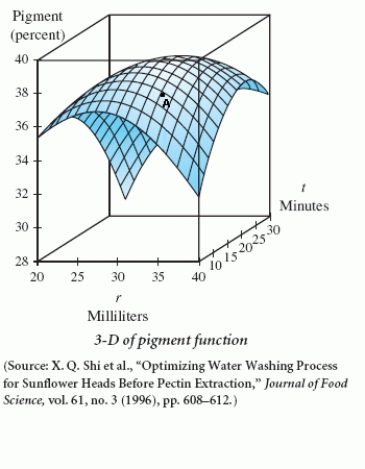
A) Input:
Output: 38
Interpretation: Washing the sunflower head for 12 minutes in 32 milliliters of water per gram of sunflower heads removes 38% of the pigment.
B) Input:
Output: 38
Interpretation: Washing the sunflower head for 32 minutes in 12 milliliters of water per gram of sunflower heads removes 38% of the pigment.
C) Input:
Output: 38
Interpretation: Washing the sunflower head for 35 minutes in 10 milliliters of water per gram of sunflower heads removes 38% of the pigment.
D) Input:
Output: 38
Interpretation: Washing the sunflower head for 10 minutes in 35 milliliters of water per gram of sunflower heads removes 62% of the pigment.
E) Input:
Output: 38
Interpretation: Washing the sunflower head for 10 minutes in 35 milliliters of water per gram of sunflower heads removes 38% of the pigment.
 Find and interpret the input and output values for the point A.
Find and interpret the input and output values for the point A. 
A) Input:

Output: 38
Interpretation: Washing the sunflower head for 12 minutes in 32 milliliters of water per gram of sunflower heads removes 38% of the pigment.
B) Input:

Output: 38
Interpretation: Washing the sunflower head for 32 minutes in 12 milliliters of water per gram of sunflower heads removes 38% of the pigment.
C) Input:

Output: 38
Interpretation: Washing the sunflower head for 35 minutes in 10 milliliters of water per gram of sunflower heads removes 38% of the pigment.
D) Input:

Output: 38
Interpretation: Washing the sunflower head for 10 minutes in 35 milliliters of water per gram of sunflower heads removes 62% of the pigment.
E) Input:

Output: 38
Interpretation: Washing the sunflower head for 10 minutes in 35 milliliters of water per gram of sunflower heads removes 38% of the pigment.

Unlock Deck
Unlock for access to all 46 flashcards in this deck.
Unlock Deck
k this deck
20
Consider the table of apparent temperatures (given below), which shows the apparent temperature (how hot it feels) given air temperature and dew point. In order to model apparent temperature as a function of the dew point when the air temperature is  which variable must be held constant?
which variable must be held constant? 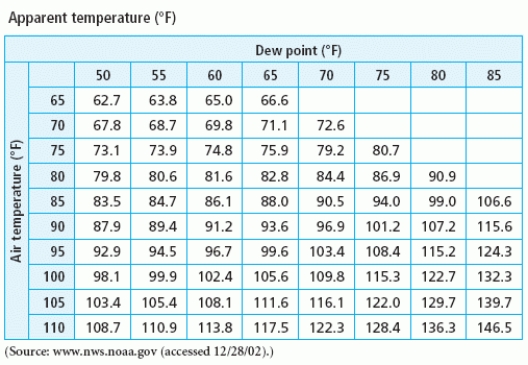
A) air temperature
B) dew point
C) apparent temperature
D)
E) no variables are held constant
 which variable must be held constant?
which variable must be held constant? 
A) air temperature
B) dew point
C) apparent temperature
D)

E) no variables are held constant

Unlock Deck
Unlock for access to all 46 flashcards in this deck.
Unlock Deck
k this deck
21
If  find
find  and
and  .
.
A)
B)
C)
D)
E)
 find
find  and
and  .
.A)

B)

C)

D)

E)


Unlock Deck
Unlock for access to all 46 flashcards in this deck.
Unlock Deck
k this deck
22
The table shows per capita peach consumption. Find a cross-sectional model for a yearly income of $40,000. 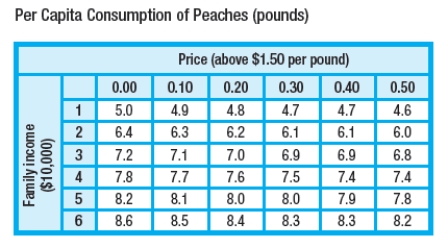
A) pounds
pounds
B) pounds
pounds
C) pounds
pounds
D) pounds
pounds
E) pounds
pounds

A)
 pounds
poundsB)
 pounds
poundsC)
 pounds
poundsD)
 pounds
poundsE)
 pounds
pounds
Unlock Deck
Unlock for access to all 46 flashcards in this deck.
Unlock Deck
k this deck
23
Two vending machines sit side by side in a a college dorm. One machine sells Coke products and the other sells Pepsi products. Daily sales of Coke products, based on the prices of the products in the two machines are shown in the table below. Find an appropriate cross sectional model to estimate the sales of Coke products when the price of Coke is $1.50. 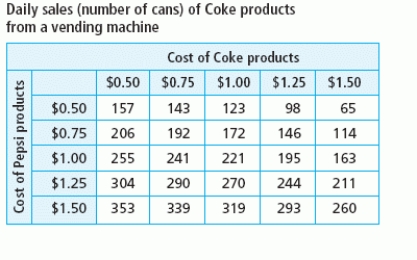
A) cans per day, where p is the cost of Pepsi
cans per day, where p is the cost of Pepsi
B) cans per day, where p is the cost of Coke
cans per day, where p is the cost of Coke
C) cans per day, where p is the cost of Pepsi
cans per day, where p is the cost of Pepsi
D) cans per day, where p is the cost of Pepsi
cans per day, where p is the cost of Pepsi
E) cans per day, where p is the cost of Coke
cans per day, where p is the cost of Coke

A)
 cans per day, where p is the cost of Pepsi
cans per day, where p is the cost of PepsiB)
 cans per day, where p is the cost of Coke
cans per day, where p is the cost of CokeC)
 cans per day, where p is the cost of Pepsi
cans per day, where p is the cost of PepsiD)
 cans per day, where p is the cost of Pepsi
cans per day, where p is the cost of PepsiE)
 cans per day, where p is the cost of Coke
cans per day, where p is the cost of Coke
Unlock Deck
Unlock for access to all 46 flashcards in this deck.
Unlock Deck
k this deck
24
The table shows per capita peach consumption. Calculate per capita peach consumption for families with a yearly income of $40,000, when the price of peaches is $1.55 per pound. 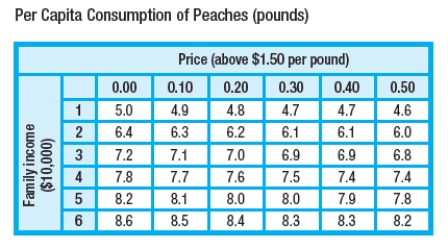
A) 7.7 pounds
B) 7.5 pounds
C) 7.6 pounds
D) 6.8 pounds
E) 6.4 pounds

A) 7.7 pounds
B) 7.5 pounds
C) 7.6 pounds
D) 6.8 pounds
E) 6.4 pounds

Unlock Deck
Unlock for access to all 46 flashcards in this deck.
Unlock Deck
k this deck
25
If  find
find  .
.
A)
B)
C)
D)
E)
 find
find  .
.A)

B)

C)

D)

E)


Unlock Deck
Unlock for access to all 46 flashcards in this deck.
Unlock Deck
k this deck
26
The table below gives the value  of an investment of P dollars after 2 years in an account whose annual percentage yield is 100r%. The value of a $10,000 investment after 2 years can be modeled by
of an investment of P dollars after 2 years in an account whose annual percentage yield is 100r%. The value of a $10,000 investment after 2 years can be modeled by  Find and interpret
Find and interpret  when the annual interest rate is 4.3%.
when the annual interest rate is 4.3%. 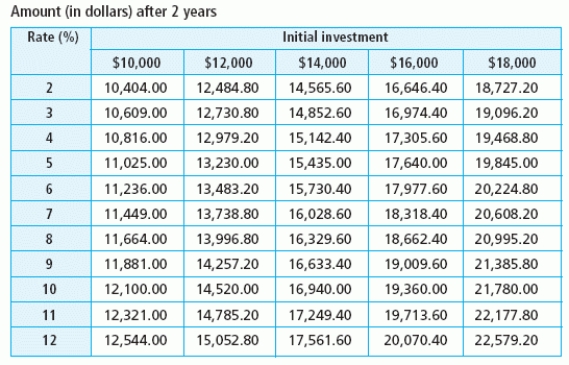
A) $8.30 per percentage point; it represents how much money a $10,000 investment would earn if the interest rate increased by one percent.
B) $1,060.00 per percentage point; it represents how much money a $10,000 investment would earn if the interest rate increased by one percent.
C) $1,060.00 per percentage point; it represents the rate of increase in value of $10,000 investment as the interest rate increases by one percent.
D) $208.60 per percentage point; it represents the rate of increase in value of $10,000 investment as the interest rate increases by one percent.
E) $104.30 per percentage point; it represents how much money in the investment is due to the interest rate.
 of an investment of P dollars after 2 years in an account whose annual percentage yield is 100r%. The value of a $10,000 investment after 2 years can be modeled by
of an investment of P dollars after 2 years in an account whose annual percentage yield is 100r%. The value of a $10,000 investment after 2 years can be modeled by  Find and interpret
Find and interpret  when the annual interest rate is 4.3%.
when the annual interest rate is 4.3%. 
A) $8.30 per percentage point; it represents how much money a $10,000 investment would earn if the interest rate increased by one percent.
B) $1,060.00 per percentage point; it represents how much money a $10,000 investment would earn if the interest rate increased by one percent.
C) $1,060.00 per percentage point; it represents the rate of increase in value of $10,000 investment as the interest rate increases by one percent.
D) $208.60 per percentage point; it represents the rate of increase in value of $10,000 investment as the interest rate increases by one percent.
E) $104.30 per percentage point; it represents how much money in the investment is due to the interest rate.

Unlock Deck
Unlock for access to all 46 flashcards in this deck.
Unlock Deck
k this deck
27
If  find
find  .
.
A)
B)
C)
D)
E)
 find
find  .
.A)

B)

C)

D)

E)


Unlock Deck
Unlock for access to all 46 flashcards in this deck.
Unlock Deck
k this deck
28
Given the function  consider the contour curve
consider the contour curve  for
for  What is the slope of the tangent line at
What is the slope of the tangent line at  Round your answer to two decimal places where appropriate.
Round your answer to two decimal places where appropriate.
A) -4.25
B) 0.24
C)
D)
E) 7.66
 consider the contour curve
consider the contour curve  for
for  What is the slope of the tangent line at
What is the slope of the tangent line at  Round your answer to two decimal places where appropriate.
Round your answer to two decimal places where appropriate.A) -4.25
B) 0.24
C)

D)

E) 7.66

Unlock Deck
Unlock for access to all 46 flashcards in this deck.
Unlock Deck
k this deck
29
If  find
find 
A)
B)
C)
D)
E)
 find
find 
A)

B)

C)

D)

E)


Unlock Deck
Unlock for access to all 46 flashcards in this deck.
Unlock Deck
k this deck
30
The per capita consumption of peaches can be modeled as  where the price of peaches
where the price of peaches  is and the person lives in a family with annual income $10,000i. Use this model to calculate the rate of change of the per capita consumption of peaches with respect to yearly income when the yearly income is $30,000 and the price is $1.70 per pound.
is and the person lives in a family with annual income $10,000i. Use this model to calculate the rate of change of the per capita consumption of peaches with respect to yearly income when the yearly income is $30,000 and the price is $1.70 per pound.
A) 0.67 pound per ten thousand dollars
B) 0.47 pound per ten thousand dollars
C) 0.57 pound per ten thousand dollars
D) 0.51 pound per ten thousand dollars
E) 0.87 pound per ten thousand dollars
 where the price of peaches
where the price of peaches  is and the person lives in a family with annual income $10,000i. Use this model to calculate the rate of change of the per capita consumption of peaches with respect to yearly income when the yearly income is $30,000 and the price is $1.70 per pound.
is and the person lives in a family with annual income $10,000i. Use this model to calculate the rate of change of the per capita consumption of peaches with respect to yearly income when the yearly income is $30,000 and the price is $1.70 per pound.A) 0.67 pound per ten thousand dollars
B) 0.47 pound per ten thousand dollars
C) 0.57 pound per ten thousand dollars
D) 0.51 pound per ten thousand dollars
E) 0.87 pound per ten thousand dollars

Unlock Deck
Unlock for access to all 46 flashcards in this deck.
Unlock Deck
k this deck
31
Two vending machines sit side by side in a a college dorm. One machine sells Coke products and the other sells Pepsi products. Daily sales of coke products, based on the prices of the products in the two machines can be modeled by the equation  cans per day, when Coke products cost $c and Pepsi products cost $p. Find and interpret
cans per day, when Coke products cost $c and Pepsi products cost $p. Find and interpret 
A) means that when the price of Pepsi products is $0.80 and the price of Coke products is $0.90, if the price of Coke products increases by $1 while the price of Pepsi products remains constant, then the daily sale of Coke products will decrease by about 81 cans.
means that when the price of Pepsi products is $0.80 and the price of Coke products is $0.90, if the price of Coke products increases by $1 while the price of Pepsi products remains constant, then the daily sale of Coke products will decrease by about 81 cans.
B) means that when the price of Pepsi products is $0.80 and the price of Coke products is $0.90, if the price of Coke products increases by $0.90 while the price of Pepsi products remains constant, then the daily sale of Coke products will decrease by about 81 cans.
means that when the price of Pepsi products is $0.80 and the price of Coke products is $0.90, if the price of Coke products increases by $0.90 while the price of Pepsi products remains constant, then the daily sale of Coke products will decrease by about 81 cans.
C) means that when the price of Pepsi products is $0.80 and the price of Coke products is $0.90, if the price of Pepsi products increases by $1 while the price of Coke products remains constant, then the daily sale of Coke products will decrease by about 81 cans.
means that when the price of Pepsi products is $0.80 and the price of Coke products is $0.90, if the price of Pepsi products increases by $1 while the price of Coke products remains constant, then the daily sale of Coke products will decrease by about 81 cans.
D) means that when the price of Pepsi products is $0.80 and the price of Coke products is $0.90, if the price of Pepsi products increases by $0.80 while the price of Coke products remains constant, then the daily sale of Coke products will increase by about 194 cans.
means that when the price of Pepsi products is $0.80 and the price of Coke products is $0.90, if the price of Pepsi products increases by $0.80 while the price of Coke products remains constant, then the daily sale of Coke products will increase by about 194 cans.
E) means that when the price of Pepsi products is $0.80 and the price of Coke products is $0.90, if the price of Pepsi products increases by $1 while the price of Coke products remains constant, then the daily sale of Coke products will increase by about 194 cans.
means that when the price of Pepsi products is $0.80 and the price of Coke products is $0.90, if the price of Pepsi products increases by $1 while the price of Coke products remains constant, then the daily sale of Coke products will increase by about 194 cans.
 cans per day, when Coke products cost $c and Pepsi products cost $p. Find and interpret
cans per day, when Coke products cost $c and Pepsi products cost $p. Find and interpret 
A)
 means that when the price of Pepsi products is $0.80 and the price of Coke products is $0.90, if the price of Coke products increases by $1 while the price of Pepsi products remains constant, then the daily sale of Coke products will decrease by about 81 cans.
means that when the price of Pepsi products is $0.80 and the price of Coke products is $0.90, if the price of Coke products increases by $1 while the price of Pepsi products remains constant, then the daily sale of Coke products will decrease by about 81 cans.B)
 means that when the price of Pepsi products is $0.80 and the price of Coke products is $0.90, if the price of Coke products increases by $0.90 while the price of Pepsi products remains constant, then the daily sale of Coke products will decrease by about 81 cans.
means that when the price of Pepsi products is $0.80 and the price of Coke products is $0.90, if the price of Coke products increases by $0.90 while the price of Pepsi products remains constant, then the daily sale of Coke products will decrease by about 81 cans.C)
 means that when the price of Pepsi products is $0.80 and the price of Coke products is $0.90, if the price of Pepsi products increases by $1 while the price of Coke products remains constant, then the daily sale of Coke products will decrease by about 81 cans.
means that when the price of Pepsi products is $0.80 and the price of Coke products is $0.90, if the price of Pepsi products increases by $1 while the price of Coke products remains constant, then the daily sale of Coke products will decrease by about 81 cans.D)
 means that when the price of Pepsi products is $0.80 and the price of Coke products is $0.90, if the price of Pepsi products increases by $0.80 while the price of Coke products remains constant, then the daily sale of Coke products will increase by about 194 cans.
means that when the price of Pepsi products is $0.80 and the price of Coke products is $0.90, if the price of Pepsi products increases by $0.80 while the price of Coke products remains constant, then the daily sale of Coke products will increase by about 194 cans.E)
 means that when the price of Pepsi products is $0.80 and the price of Coke products is $0.90, if the price of Pepsi products increases by $1 while the price of Coke products remains constant, then the daily sale of Coke products will increase by about 194 cans.
means that when the price of Pepsi products is $0.80 and the price of Coke products is $0.90, if the price of Pepsi products increases by $1 while the price of Coke products remains constant, then the daily sale of Coke products will increase by about 194 cans.
Unlock Deck
Unlock for access to all 46 flashcards in this deck.
Unlock Deck
k this deck
32
Two vending machines sit side by side in a a college dorm. One machine sells Coke products and the other sells Pepsi products. Daily sales of Coke products, based on the prices of the products in the two machines are shown in the table below. In order to estimate the sales of Coke products when the price of Coke is $0.75, which variable should be held constant? 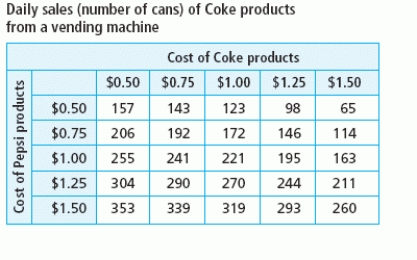
A) no variables need to be held constant
B) the daily sales of Coke products
C) the cost of Coke and Pepsi
D) the cost of Coke
E) the cost of Pepsi

A) no variables need to be held constant
B) the daily sales of Coke products
C) the cost of Coke and Pepsi
D) the cost of Coke
E) the cost of Pepsi

Unlock Deck
Unlock for access to all 46 flashcards in this deck.
Unlock Deck
k this deck
33
If  find
find 
A)
B)
C)
D)
E) 3
 find
find 
A)

B)

C)

D)

E) 3

Unlock Deck
Unlock for access to all 46 flashcards in this deck.
Unlock Deck
k this deck
34
The value  of an investment of P dollars after 4 years in an account with annual percentage yield 100r% is given by the function
of an investment of P dollars after 4 years in an account with annual percentage yield 100r% is given by the function  dollars. Find and interpret
dollars. Find and interpret 
A) shows how the value of a $10,000 investment changes as the yield rate, 100r%, changes.
shows how the value of a $10,000 investment changes as the yield rate, 100r%, changes.
B) is the cross-sectional model representing the value of $10,000 invested 4 years, as a function of the annual percentage yield, 100r%.
is the cross-sectional model representing the value of $10,000 invested 4 years, as a function of the annual percentage yield, 100r%.
C) represents how much money a $10,000 investment earned after 4 years at an annual percentage yield rate of 100r%.
represents how much money a $10,000 investment earned after 4 years at an annual percentage yield rate of 100r%.
D) shows how the value of a $10,000 investment changes as the yield rate, 100r%, changes.
shows how the value of a $10,000 investment changes as the yield rate, 100r%, changes.
E) represents how much money a $10,000 investment earned after 4 years at an annual percentage yield rate of 100r%.
represents how much money a $10,000 investment earned after 4 years at an annual percentage yield rate of 100r%.
 of an investment of P dollars after 4 years in an account with annual percentage yield 100r% is given by the function
of an investment of P dollars after 4 years in an account with annual percentage yield 100r% is given by the function  dollars. Find and interpret
dollars. Find and interpret 
A)
 shows how the value of a $10,000 investment changes as the yield rate, 100r%, changes.
shows how the value of a $10,000 investment changes as the yield rate, 100r%, changes.B)
 is the cross-sectional model representing the value of $10,000 invested 4 years, as a function of the annual percentage yield, 100r%.
is the cross-sectional model representing the value of $10,000 invested 4 years, as a function of the annual percentage yield, 100r%.C)
 represents how much money a $10,000 investment earned after 4 years at an annual percentage yield rate of 100r%.
represents how much money a $10,000 investment earned after 4 years at an annual percentage yield rate of 100r%.D)
 shows how the value of a $10,000 investment changes as the yield rate, 100r%, changes.
shows how the value of a $10,000 investment changes as the yield rate, 100r%, changes.E)
 represents how much money a $10,000 investment earned after 4 years at an annual percentage yield rate of 100r%.
represents how much money a $10,000 investment earned after 4 years at an annual percentage yield rate of 100r%.
Unlock Deck
Unlock for access to all 46 flashcards in this deck.
Unlock Deck
k this deck
35
If  find
find 
A)
B)
C)
D)
E)
 find
find 
A)

B)

C)

D)

E)


Unlock Deck
Unlock for access to all 46 flashcards in this deck.
Unlock Deck
k this deck
36
If  find
find  .
.
A)
B)
C)
D)
E)
 find
find  .
.A)

B)

C)

D)

E)


Unlock Deck
Unlock for access to all 46 flashcards in this deck.
Unlock Deck
k this deck
37
Find  .
. 
A)
B)
C)
D)
E)
 .
. 
A)

B)

C)

D)

E)


Unlock Deck
Unlock for access to all 46 flashcards in this deck.
Unlock Deck
k this deck
38
The value  of an investment of $4,000 after t years in an account for which the interest rate 100r% is compounded continuously is given by the function
of an investment of $4,000 after t years in an account for which the interest rate 100r% is compounded continuously is given by the function  dollars. Write the partial derivative
dollars. Write the partial derivative 
A)
B)
C)
D)
E)
 of an investment of $4,000 after t years in an account for which the interest rate 100r% is compounded continuously is given by the function
of an investment of $4,000 after t years in an account for which the interest rate 100r% is compounded continuously is given by the function  dollars. Write the partial derivative
dollars. Write the partial derivative 
A)

B)

C)

D)

E)


Unlock Deck
Unlock for access to all 46 flashcards in this deck.
Unlock Deck
k this deck
39
Consider the table of apparent temperatures (given below), which shows the apparent temperature (how hot it feels) given air temperature and dew point. Consider a model of the apparent temperature as a function of the dew point when the air temperature is  How is this information represented in the table?
How is this information represented in the table? 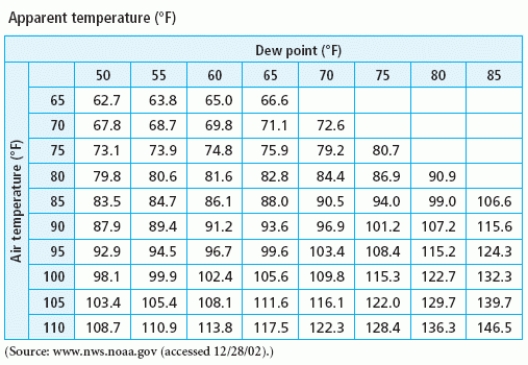
A) as a column
B) as a row
C) as a cell
D) by the entire table
E) by a row and a column
 How is this information represented in the table?
How is this information represented in the table? 
A) as a column
B) as a row
C) as a cell
D) by the entire table
E) by a row and a column

Unlock Deck
Unlock for access to all 46 flashcards in this deck.
Unlock Deck
k this deck
40
If 
 .
.
A)
B)
C)
D)
E)

 .
.A)

B)

C)

D)

E)


Unlock Deck
Unlock for access to all 46 flashcards in this deck.
Unlock Deck
k this deck
41
Consider the function  When
When  and
and  approximate to two decimal places the changed needed in n to compensate for
approximate to two decimal places the changed needed in n to compensate for 
A) -2.61
B) -0.38
C) -1.04
D) -0.15
E) -0.10
 When
When  and
and  approximate to two decimal places the changed needed in n to compensate for
approximate to two decimal places the changed needed in n to compensate for 
A) -2.61
B) -0.38
C) -1.04
D) -0.15
E) -0.10

Unlock Deck
Unlock for access to all 46 flashcards in this deck.
Unlock Deck
k this deck
42
Consider the function  When
When  and
and  approximate to two decimal places the changed needed in n to compensate for
approximate to two decimal places the changed needed in n to compensate for 
A) -1.63
B) -0.62
C) -0.41
D) -0.15
E) -6.50
 When
When  and
and  approximate to two decimal places the changed needed in n to compensate for
approximate to two decimal places the changed needed in n to compensate for 
A) -1.63
B) -0.62
C) -0.41
D) -0.15
E) -6.50

Unlock Deck
Unlock for access to all 46 flashcards in this deck.
Unlock Deck
k this deck
43
A process to extract pectin and pigment from sunflower heads involves washing the sunflower heads in heated water. Suppose that the percentage of the pigment that can be removed from a sunflower head by washing for 15 minutes can be modeled by  percent where r milliliters of
percent where r milliliters of  water is used for each gram of sunflower heads. Write a formula for the rate of change in the amount of water used with respect to a change in temperature when 47% of pigment is removed.
water is used for each gram of sunflower heads. Write a formula for the rate of change in the amount of water used with respect to a change in temperature when 47% of pigment is removed.
A)
B)
C)
D)
E)
 percent where r milliliters of
percent where r milliliters of  water is used for each gram of sunflower heads. Write a formula for the rate of change in the amount of water used with respect to a change in temperature when 47% of pigment is removed.
water is used for each gram of sunflower heads. Write a formula for the rate of change in the amount of water used with respect to a change in temperature when 47% of pigment is removed.A)

B)

C)

D)

E)


Unlock Deck
Unlock for access to all 46 flashcards in this deck.
Unlock Deck
k this deck
44
The cost of having specialty T-shirts made depends on the number of colors used in the T-shirt design and the number of T-shirts being ordered. A function giving A, the average cost per T-shirt, when c colors are used and n T-shirts are ordered is  dollars. Find a formula for
dollars. Find a formula for  If the average cost is to remain constant, would you expect
If the average cost is to remain constant, would you expect  to be positive or negative?
to be positive or negative?
A) ; positive
; positive
B) ; positive
; positive
C) ; negative
; negative
D) ; negative
; negative
E) ; negative
; negative
 dollars. Find a formula for
dollars. Find a formula for  If the average cost is to remain constant, would you expect
If the average cost is to remain constant, would you expect  to be positive or negative?
to be positive or negative?A)
 ; positive
; positiveB)
 ; positive
; positiveC)
 ; negative
; negativeD)
 ; negative
; negativeE)
 ; negative
; negative
Unlock Deck
Unlock for access to all 46 flashcards in this deck.
Unlock Deck
k this deck
45
Given the function  consider the contour curve
consider the contour curve  for
for  and
and  What is the slope of the tangent line at
What is the slope of the tangent line at  Round your answer to two decimal places where appropriate.
Round your answer to two decimal places where appropriate.
A)
B)
C) 144.52
D) 23.69
E) -0.16
 consider the contour curve
consider the contour curve  for
for  and
and  What is the slope of the tangent line at
What is the slope of the tangent line at  Round your answer to two decimal places where appropriate.
Round your answer to two decimal places where appropriate.A)

B)

C) 144.52
D) 23.69
E) -0.16

Unlock Deck
Unlock for access to all 46 flashcards in this deck.
Unlock Deck
k this deck
46
The cost of having specialty T-shirts made depends on the number of colors used in the T-shirt design and the number of T-shirts being ordered. A function giving A, the average cost per T-shirt, when c colors are used and n T-shirts are ordered is  dollars. If 350 T-shirts are printed with six colors, determine (to the nearest hundredth of a cent) how quickly the average cost is changing when more T-shirts are printed.
dollars. If 350 T-shirts are printed with six colors, determine (to the nearest hundredth of a cent) how quickly the average cost is changing when more T-shirts are printed.
A) 0.02 cents per T-shirt
B) -0.10 cents per T-shirt
C) 0.99 cents per T-shirt
D) -0.12 cents per T-shirt
E) -0.03 cents per T-shirt
 dollars. If 350 T-shirts are printed with six colors, determine (to the nearest hundredth of a cent) how quickly the average cost is changing when more T-shirts are printed.
dollars. If 350 T-shirts are printed with six colors, determine (to the nearest hundredth of a cent) how quickly the average cost is changing when more T-shirts are printed.A) 0.02 cents per T-shirt
B) -0.10 cents per T-shirt
C) 0.99 cents per T-shirt
D) -0.12 cents per T-shirt
E) -0.03 cents per T-shirt

Unlock Deck
Unlock for access to all 46 flashcards in this deck.
Unlock Deck
k this deck


